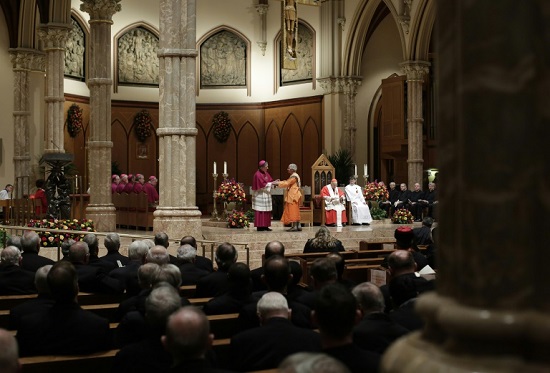Start Total Christian Certification Course FREE Now!
US bishops preparing for a meeting to address the sexual abuse scandal roiling the Catholic Church suddenly find themselves in a high-stakes credibility test following a damning report accusing them of underplaying the crisis.
Illinois Attorney General Lisa Madigan on Wednesday issued an explosive report accusing the states Catholic dioceses of not releasing the names of at least 500 clergy accused of sexually abusing children.
The timing of the report, which said accusations have been leveled against 690 priests, while Catholic officials have publicly identified only 185, was no coincidence.
The Midwestern state’s top prosecutor said it was intended to be “a critical document for discussion” for the bishops as they prepare to meet for a spiritual retreat in January at a seminary in suburban Chicago.
The sex abuse crisis is to be the main topic of discussion ahead of a summit in Rome convened for February next year by Pope Francis and organized with the help of Chicago Cardinal Blase Cupich.
“The Catholic Church itself has yet to undertake policies to ensure accountability of its bishops for their part in covering up clergy sex abuse against minors,” Madigan’s report said.
Mathew Schmalz, an expert on the Church and religious studies professor at the College of The Holy Cross in Massachusetts, said the Church faced a Herculean task undoing its mistakes.
“Certainly, the bishops will face further pressure to follow through on transparency and reporting requirements,” Schmalz told AFP.
“But their credibility has been so weakened that they are also facing the possibility that any effort they make will have little to no credibility.”
The increased public spotlight on the Church comes at a time when officials are facing ever more pressure from law enforcement to be more forthcoming.
Attorneys general in around a dozen states have opened criminal investigations.
Earlier this month, officials of the Jesuit order of the Catholic Church overseeing at least 40 US states released the names of more than 240 members accused of abuse dating back to the 1950s.
– Report ‘not fair’ –
 AFP / Gal ROMAChild abuse scandals surrounding the Catholic Church
AFP / Gal ROMAChild abuse scandals surrounding the Catholic Church
“There’s an unprecedented amount of public pressure and legal pressure on the Catholic Church,” Anne Doyle, co-director of the abuse tracking site Bishop Accountability, told AFP.
“Because the Vatican has failed to clean house, prosecutors are doing the work for them and I don’t see any end in sight.”
Doyle said the Madigan report undermined Cupich’s position in the upcoming Vatican summit, because “under his watch, the bishops of Illinois have concealed hundreds of abusers’ names.”
“If he cannot exercise oversight of the dioceses in his area, how can he possibly lead the world’s bishops to any kind of adequate solution?” she added.
The reaction to the report from church officials has been a mix of the contrition usually expressed at new abuse revelations and pushback at the notion that allegations were swept under the rug.
Church officials said they have been forthcoming of all allegations they have been able to substantiate and cooperative with law enforcement.
“The idea that clergy sexual abuse of minors is more extensive than [we] reported is just false,” William Kunkel, counsel for the Chicago archdiocese, told The Washington Post.
“It’s not fair to put out a list of people accused, any more than it would be fair to put out a list of accused reporters,” he said.
– What is ‘credible’? –
Among the biggest points of contention between victims’ advocates and the Church is what constitutes a “credible” abuse accusation. Advocates say the church hides behind the distinction.
Madigan’s report said church officials looked for reasons not to deem an allegation credible, including looking for ways to discredit survivors.
“We have long taken issue with the term ‘credible,'” the Survivors Network of those Abused by Priests (SNAP) said in a statement.
“The threshold for what is and what is not ‘credible’ changes from diocese to diocese, meaning there is no clarity, precision, or usefulness to the term.”
The results of the ongoing Illinois investigation, which began in August, are still preliminary and more revelations are expected.
The investigation came on the heels of an August grand jury report out of Pennsylvania that found more than 300 suspected predator priests and more than 1,000 victims had been covered up for decades.
That report spurred criminal investigations in approximately a dozen states and the launch of the first federal probe into the Pennsylvania dioceses.
“State governments, such as Illinois, simply do not trust the Catholic Church to follow through on its promises and move toward greater transparency and accountability,” Schmalz said.
As bishops plan to meet in Chicago to address the crisis, he said they face “the real possibility of having to cede investigative authority and oversight to authorities outside the Church.”
[AFP]















